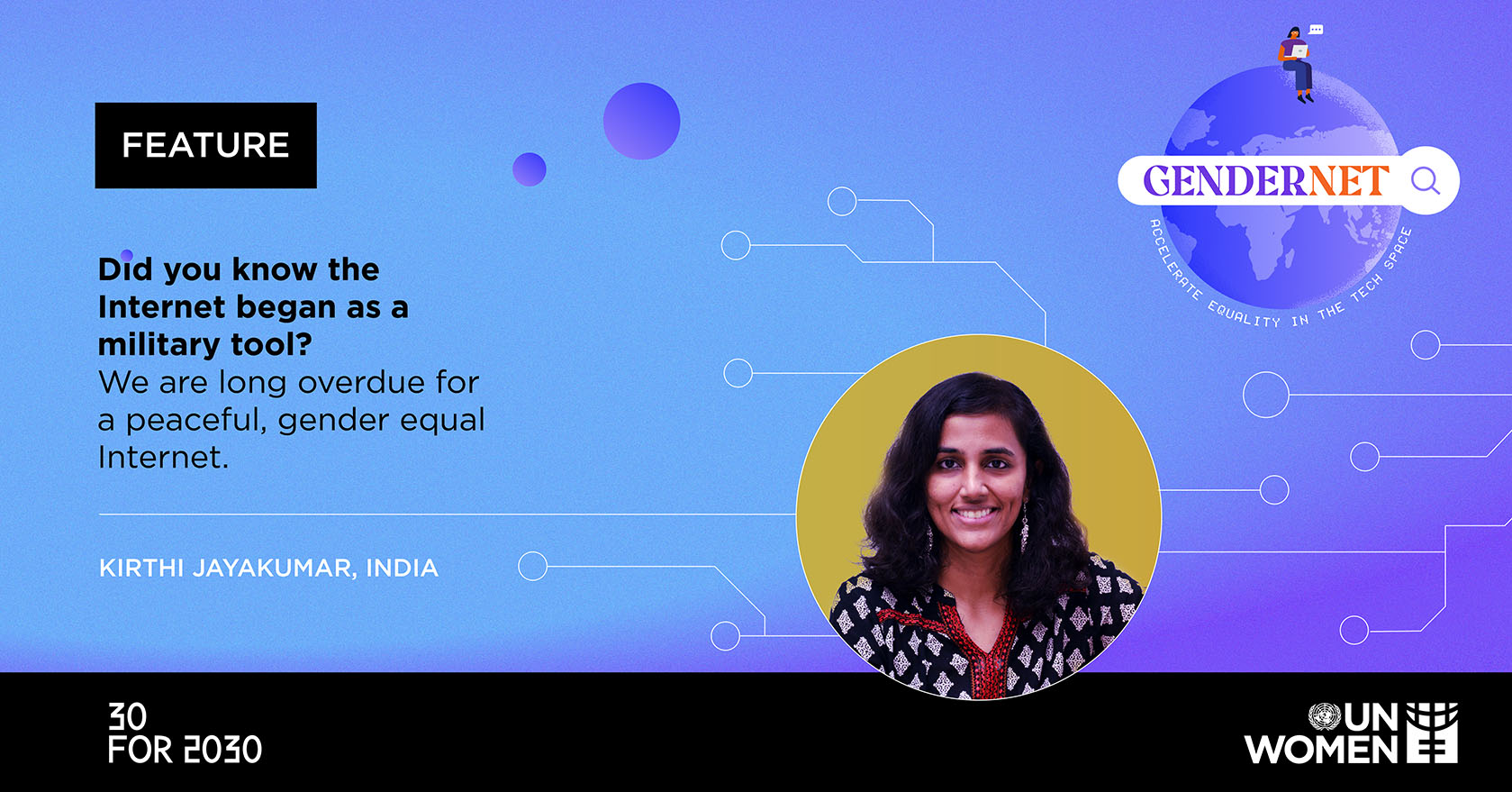This article is part of the GenderNet Campaign, supported by the Changemakers Project: Youth, Technology and Innovation to End Violence Against Women and Girls in Asia and the Pacific (2021-2023) with the generous fund from the Government of the Republic of Korea, through the Ministry of Gender Equality and Family.
Women, peace, and cybersecurity: A new frontier for change
Date:
Author: Kirthi Jayakumar, 30 for 2030 Network Member

The internet has come a long way since its early days as a “packet switching” network for the military. But along with instant, free access to global information, how-to instructionals and cat videos, it has seen a relentless rise in verbal and image-based abuse, private images circulated without consent, hate speech, and unsolicited advances - almost always targeting women and non-binary people.
Welcome to the internet: Born for military use, and now the site of unique forms of gender-based violence.
The internet as a site of violence
The internet is a digital public place. It is characterized by patriarchy, misogyny, heteronormativity, and sexism that thrives offline. The additional layer of anonymity that the internet offers creates the perfect enabling environment. The device sending you rude messages or unsolicited images could be in the hands of a stranger several time zones away, in a house down the street, or even on the same bus as you. The meaning of security, then, needs a new lens: One that accommodates a nuanced understanding of the gendered experience of cyberspace.
In building that sense of security, the women, peace, and security (WPS) agenda can be particularly helpful.
What is the WPS agenda?
“The meaning of security, then, needs a new lens: One that accommodates a nuanced understanding of the gendered experience of cyberspace.”
— Kirthi Jayakumar, 30 for 2030 Network Member
Starting in 2000, the WPS agenda emerged with UN Security Council Resolution 1325. This resolution called attention to the prevalence of conflict-related sexual violence as a deliberate war tactic and highlighted the absence of women in peace processes. Over the following nearly two decades nine more resolutions were adopted, expanding on the WPS agenda. Today, the agenda continues to amplify its original calls, while also acknowledging that violence takes place across the peacetime-wartime continuum.
The agenda is operationalized on the ground in different ways. As many as 100 countries have adopted WPS National Action Plans with specific steps. In Nigeria, the government and civil society have gone further by adopting State Action Plans, translating the National Action Plan into concrete steps at the grassroots. Scholar and peace educator Betty Reardon calls for Civilian Action Plans, where she makes the compelling case for civic society to step up to implement the agenda on the ground as a new means of implementation, centring people in the process.
Applying the WPS agenda to cybersecurity
Implementing the WPS agenda can be a significant route to keeping the internet a safe space, free of gender-based violence and discrimination. At first glance, it might seem strange to apply a set of resolutions that speak to conflict, to cyberspace. However, a deeper reading of the WPS agenda suggests that it is a transformative set of documents that can form a strong foundation to peaceful, nonviolent futures be that in conflict zones or online.
Gender-based violence takes place in peacetime and wartime, and so long as it exists there is no true peace. The internet has become a site of this violence: from targeted attacks directed at women, girls and people with diverse sexual orientations, gender identities, gender expressions and sex characteristics (SOGIESC) who face significant online harassment and threats for merely existing online, to systemic campaigns targeting women for their religious, racial, ethnic, and caste identities. Applying the WPS agenda to address this online violence can help build a safer internet by eliminating overt gender-based violence and discrimination and factors that enable them.
Women and people with diverse SOGIESC have a fundamental right to an equal agency in public places including the internet. This participation is currently frugal at best: Most communities do not include them in their cybersecurity policymaking or securitizing endeavours. Without their participation, no policy, law, or security process is complete, as these measures do not address the concerns of an enormously significant proportion of people who use, depend on, and need the internet in their daily lives.
However, applying the WPS agenda is not only for the policy level: As civilians, human beings with full rights and agency, all citizens can play a part too. Can we chart out civilian action plans that can define our engagement with the internet without debating anyone's full humanity, or normalizing violence against it?
To me, this looks like a set of principles led, defined and implemented by the community, that would help us navigate cyberspace in feminist ways. It looks like prioritizing the values of intersectionality, inclusion, human security, empathy, and compassion. It also looks like a dynamically evolving community of practice, informed by the principles of transparency, accountability, and transformative justice.